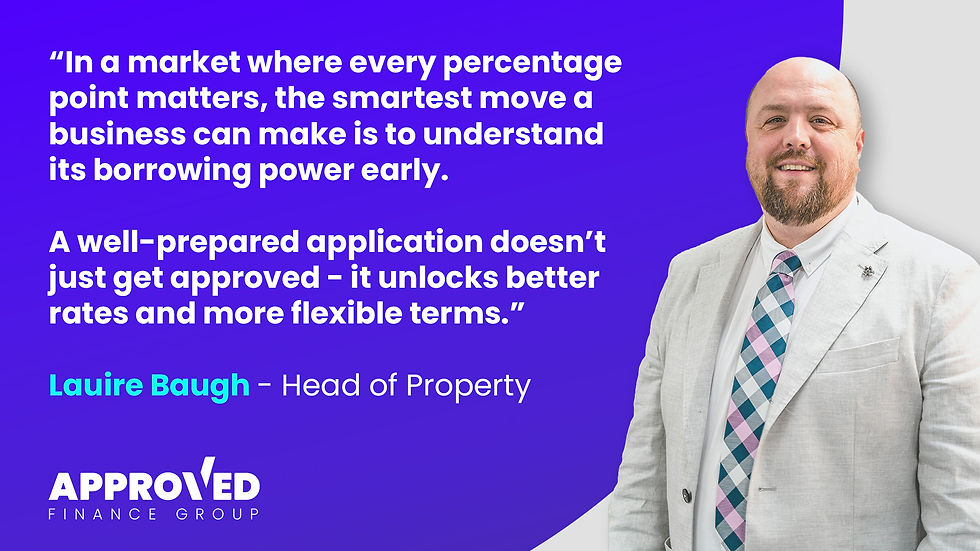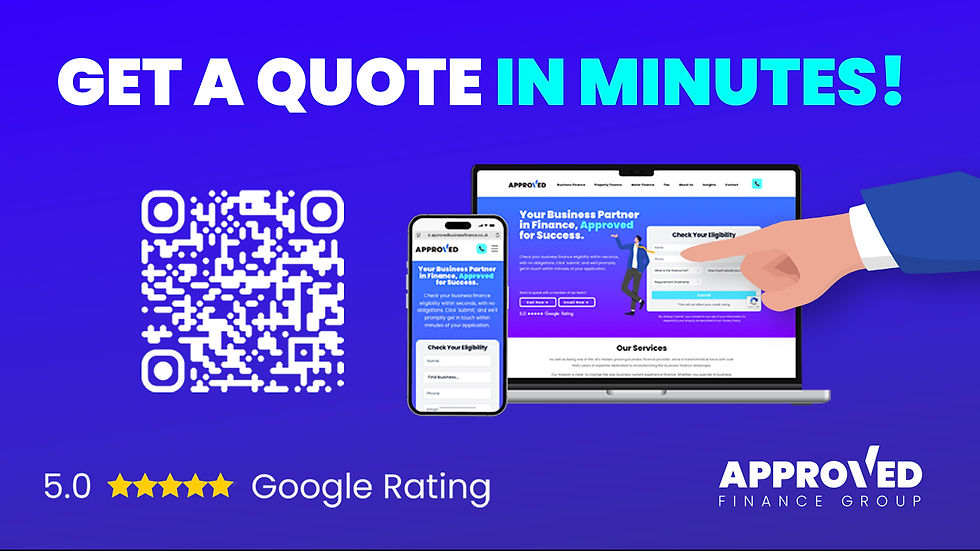Commercial Mortgage Rates Guide
- Laurie Baugh

- Jul 24, 2025
- 5 min read

What is a Commercial Mortgage?
A commercial mortgage is a loan secured against a property that's used for business purposes. Unlike residential mortgages, which are for personal homes, commercial mortgages are typically used to:
Purchase premises for your own business
Buy property as an investment (to lease out)
Refinance or release equity from an existing commercial asset
Commercial mortgage interest rates are generally higher than residential rates due to the increased risk to lenders. The loan amount, term, and interest rate will depend on your business’s financial health, the property’s value, and the lender’s criteria.
Commercial Mortgage Rates in 2025
As of mid-2025, commercial mortgage interest rates in the UK typically range between 5.5% and 8%, depending on the lender, the type of property, and the strength of the business’s application. While the Bank of England’s base rate currently sits at 4.25%, commercial lending rates remain higher due to the added risk lenders take on with business borrowing.
Will Commercial Mortgage Rates drop in 2025?
With inflation softening and the base rate having already fallen to 4.25%, there’s growing speculation that lenders could begin easing commercial mortgage rates in the latter half of 2025. However, rate cuts are likely to be modest. When it comes to sectors like hospitality, retail, or new businesses without a strong trading history, stay cautious of this.
That means waiting for a significant rate drop may not pay off, especially if your business is in a strong position to borrow now. Locking in a competitive fixed rate could offer greater certainty for your business cash flow. To learn more about this, contact one of our team to discuss the best options for your business.
How hard is it to get a commercial mortgage?
Securing a commercial mortgage is very achievable but it’s not always straightforward. Lenders will typically assess your trading history, turnover, credit record, and how the property will be used. Owner-occupied mortgages tend to be easier to secure than buy-to-let or semi-commercial loans.
Speaking with one of our experts will help you get where you need to be, so feel free to get in touch today.
What is a good commercial rate?
Given the current base rate of 4.25%, a “good” commercial mortgage rate in 2025 would typically fall in the 5.5% to 6.5% range, especially for low-risk, owner-occupied properties with a healthy deposit. Rates for commercial investment mortgages may sit closer to 7-8%.
However, “good” is relative and your business profile, sector, and goals all play a part. The key is finding a lender that understands your business and offers a deal aligned with your cash flow and growth plans.

Types of Commercial Mortgage Interest Rates
When applying for a commercial mortgage, one of the first choices you'll make is whether to go for a fixed or variable rate. Here’s how they differ and what that could mean for your repayments:
Fixed Commercial Mortgage Rates
A fixed rate means your interest stays the same for a set period. This could be two, five, or even ten years.
Pros:
Certainty over monthly repayments
Easier to manage cash flow and budgeting
Protection from future interest rate rises
Cons:
You won’t benefit if rates drop during the fixed term
There are usually early repayment charges if you want to exit the deal early
For example: A 5-year fixed commercial mortgage rate at 6.5% means your repayments remain exactly the same for the next five years, regardless of market changes.
Variable Commercial Mortgage Rates
Variable rates fluctuate in line with either the Bank of England base rate or your lender’s Standard Variable Rate (SVR). This means your monthly payments could go up or down.
Pros:
Potential to benefit from falling interest rates
Often more flexible if you want to repay early or switch lenders
Cons:
Repayments can change, which may impact your budgeting
More risk if rates increase significantly
Feature | Fixed Rate | Variable Rate |
Interest stays the same | Yes | No |
Flexible early repayments | Less flexible | Often more flexible |
Suited for | Predictable cash flow needs | Businesses comfortable with variation |
Exposure to interest rate risk | Low | High |

What are the different types of commercial mortgages?
There’s more than one type of commercial mortgage, and the best option for you will depend on how you plan to use the property. Here’s a quick overview of the most common types:
Commercial Investment Mortgages
Designed for landlords or investors who plan to rent out the property to tenants:
Often available on an interest-only basis
Higher interest rates than owner-occupied mortgages
Rental income is typically used to cover the repayments
Owner-Occupied Commercial Mortgages
These are for businesses that want to own and operate from the property themselves:
Often have lower interest rates due to reduced risk
Gives the business full control over its premises
Allows you to build equity over time
Semi-Commercial Mortgages
Used for properties with both commercial and residential elements, such as a shop with a flat above.
Available for both investors and owner-occupiers
The rate and terms will vary based on how much of the property is commercial versus residential
Commercial Bridging Loans
Short-term finance solutions used when speed is a priority:
Ideal for auction purchases, refurbishments, or while waiting for long-term finance to complete
Higher interest rates than standard mortgage
Typically repaid within 12 to 24 months
Refinancing or Remortgaging a Commercial Property
If you already own a commercial property, refinancing can help you:
Secure a better interest rate
Release equity to reinvest in your business
Switch to a lender with more favourable terms
What Fees Are Involved in a Commercial Mortgage?
Alongside the interest rate, there are several key costs to keep in mind:
Arrangement Fee: Usually 1-2% of the loan, charged by the lender.
Valuation Fee: Covers the cost of assessing the property's value.
Legal Fees: Payable for both your solicitor and possibly the lender’s.
Broker Fee: Charged if you use a commercial mortgage broker.
Early Repayment Charges: Apply if you leave a fixed deal early.
These costs can vary widely depending on the property, loan size and lender, so be sure to get a clear breakdown early on.
How to Get the Best Commercial Mortgage Rates
To access the best rates, start by improving your business credit score: the stronger your financial profile, the more appealing you are to lenders. A larger deposit also helps, as lower loan-to-value ratios usually mean lower interest rates.
It’s worth comparing fixed and variable deals to see what suits your goals, and don’t underestimate the value of a good broker. They can open doors to lenders you might not find on your own and help you secure the most competitive terms.
Ready to explore your commercial mortgage options?

At Approved, we make commercial mortgages simple. Whether you're buying, refinancing or investing in property, we’ll help you secure the right terms for you and your business. Contact us today.

















